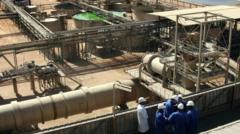Alberta’s call for independence is intensifying, fueled by political alienation and dissatisfaction with the federal Liberal government. Amidst a backdrop of rising separatist rhetoric, a group of activists is pushing for Alberta's sovereignty, raising questions about the province's future relationship with Canada and the possibility of aligning with the United States.
Alberta's Independence Movement Gains Momentum Amid Political Frustration

Alberta's Independence Movement Gains Momentum Amid Political Frustration
Western Canadian resentment grows, urging Alberta's independence amidst current political climate.
Over the weekend, a gathering in Lethbridge drew attention as dozens of participants signaled their support for Alberta to either gain more autonomy or pursue independence entirely. This reflection of sentiment encapsulates a broader divide felt across Alberta, particularly against the backdrop of perceived federal neglect and recent comments from U.S. President Donald Trump about Canada potentially becoming the 51st state.
Dennis Modry, a co-leader of the Alberta Prosperity Project and retired heart surgeon, addressed the crowd, noting an uptick in separatist discussions as frustrations mount under a decade of Liberal governance. While some long for independence, others, like lawyer and rancher Jeffrey Rath, suggest Alberta’s interests align more closely with American regional neighbors than with the eastern provinces of Canada.
The concept of a "national unity crisis" is surfacing prominently in discussions, especially as the federal Liberal Party under Mark Carney is expected to maintain power. Alberta’s Premier, Danielle Smith, has expressed concerns that failure to address provincial demands swiftly could exacerbate feelings of alienation, though she contests the viability of complete separation.
Diverse opinions exist even among separatists, with some advocating for better relations with Ottawa rather than outright independence. Judy Schneider, an oil industry supporter, believes independence could be beneficial, viewing the current system as fundamentally flawed. Conversely, Lorna Guitton, another grassroots activist, justifies her call for a referendum as leverage for negotiation rather than an outright divorce from Canada.
The eventual outcome of Alberta’s independence aspirations faces skepticism, with polls indicating that only a quarter of Albertans support secession at present. Nonetheless, the sentiments resonate beyond mere rhetoric, prompting political analysts to predict challenges for whichever leader emerges victorious in the upcoming election.
With both the regional divide and changing demographics influencing voting behaviors, Alberta’s political landscape is evolving. As discussions continue on what it means to be represented, the question of Alberta’s fate within or outside Canada grows increasingly complex.
Dennis Modry, a co-leader of the Alberta Prosperity Project and retired heart surgeon, addressed the crowd, noting an uptick in separatist discussions as frustrations mount under a decade of Liberal governance. While some long for independence, others, like lawyer and rancher Jeffrey Rath, suggest Alberta’s interests align more closely with American regional neighbors than with the eastern provinces of Canada.
The concept of a "national unity crisis" is surfacing prominently in discussions, especially as the federal Liberal Party under Mark Carney is expected to maintain power. Alberta’s Premier, Danielle Smith, has expressed concerns that failure to address provincial demands swiftly could exacerbate feelings of alienation, though she contests the viability of complete separation.
Diverse opinions exist even among separatists, with some advocating for better relations with Ottawa rather than outright independence. Judy Schneider, an oil industry supporter, believes independence could be beneficial, viewing the current system as fundamentally flawed. Conversely, Lorna Guitton, another grassroots activist, justifies her call for a referendum as leverage for negotiation rather than an outright divorce from Canada.
The eventual outcome of Alberta’s independence aspirations faces skepticism, with polls indicating that only a quarter of Albertans support secession at present. Nonetheless, the sentiments resonate beyond mere rhetoric, prompting political analysts to predict challenges for whichever leader emerges victorious in the upcoming election.
With both the regional divide and changing demographics influencing voting behaviors, Alberta’s political landscape is evolving. As discussions continue on what it means to be represented, the question of Alberta’s fate within or outside Canada grows increasingly complex.





















